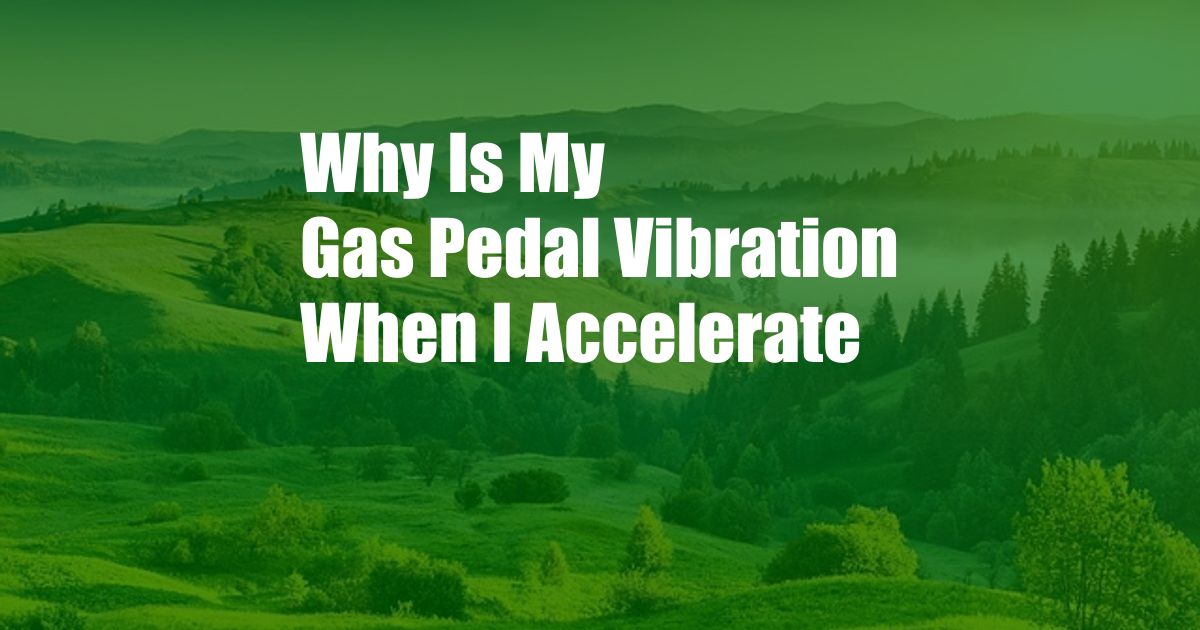
Why Is My Gas Pedal Vibrating When I Accelerate?
As my car sped down the highway, I gripped the steering wheel tightly. Suddenly, the gas pedal began to vibrate violently beneath my foot, sending shockwaves through my entire body. Fear and confusion washed over me as I struggled to maintain control of the vehicle. What could be causing this strange and potentially dangerous occurrence?
To understand the causes of a vibrating gas pedal, we must delve into the inner workings of a car’s engine and its transmission.
Driveline Problems
The driveline, composed of the driveshaft, differential, and axles, transmits power from the engine to the wheels. Any issues with these components can manifest as vibrations in the gas pedal.
- Faulty Driveshaft: A bent or unbalanced driveshaft can cause excessive vibrations. This can occur due to damage from road debris, improper installation, or worn-out parts.
- Differential Problems: The differential distributes power between the wheels. Malfunctioning bearings or gears within the differential can lead to vibrations.
- Axle Issues: Worn or damaged axle shafts or bearings can cause vibrations, especially when cornering or accelerating.
Engine Issues
Vibrations in the gas pedal can also stem from problems within the engine itself.
- Engine Mounts: These mounts secure the engine to the frame of the car. Failing mounts can allow the engine to move excessively, causing vibrations.
- Spark Plugs: Worn or fouled spark plugs can cause misfires, resulting in uneven combustion and vibrations.
- Fuel Injector Issues: Clogged or malfunctioning fuel injectors can disrupt the smooth delivery of fuel to the engine, leading to vibrations.
Transmission Problems
The transmission is responsible for transmitting power from the engine to the wheels. Faults in the transmission can also be a source of vibrations in the gas pedal.
- Clutch Problems: A slipping or worn clutch can cause shuddering and vibrations, especially during acceleration.
- Transmission Mount Issues: Similar to engine mounts, failing transmission mounts can allow excessive movement, resulting in vibrations.
- Internal Transmission Problems: Malfunctioning gears or bearings within the transmission can also lead to vibrations.
Tips and Expert Advice
If you experience vibrations in the gas pedal, it’s crucial to address the issue promptly. Ignoring it could lead to further damage and safety concerns.
- Safety First: If the vibrations are severe, pull over to a safe location and turn off the engine. Do not attempt to drive with excessive vibrations.
- Consult a Mechanic: Diagnosing the cause of gas pedal vibrations can be complex. Seek professional help from a qualified mechanic.
- Regular Maintenance: Regular maintenance, including oil changes, transmission fluid flushes, and wheel alignments, can help prevent driveline problems.
- Check Tire Balance: Unbalanced tires can cause vibrations throughout the vehicle, including the gas pedal.
- Inspect Engine Mounts: Worn or damaged engine mounts should be replaced to minimize vibrations.
Frequently Asked Questions
- Q: Can gas pedal vibrations be dangerous?
A: Severe gas pedal vibrations can be dangerous, as they may affect vehicle stability and control. - Q: What are some common causes of gas pedal vibrations?
A: Common causes include driveline problems, engine issues, and transmission faults. - Q: Can I fix gas pedal vibrations myself?
A: Attempting to fix gas pedal vibrations yourself is not recommended. It’s best to consult a mechanic for diagnosis and repair. - Q: How much does it cost to repair gas pedal vibrations?
A: Repair costs vary depending on the underlying cause. However, expect to pay between $100 and $1,000. - Q: Can regular maintenance prevent gas pedal vibrations?
A: Regular maintenance, such as oil changes and wheel alignments, can help prevent driveline problems that may lead to vibrations.
Conclusion
Gas pedal vibrations can be caused by various factors, affecting engine performance and vehicle stability. If you encounter this issue, do not hesitate to seek professional assistance. Remember, maintaining your vehicle in good condition through regular maintenance can help prevent potential problems and ensure a smooth and safe driving experience.
Are you interested in exploring more automotive topics? If so, feel free to browse our website for additional informative articles.